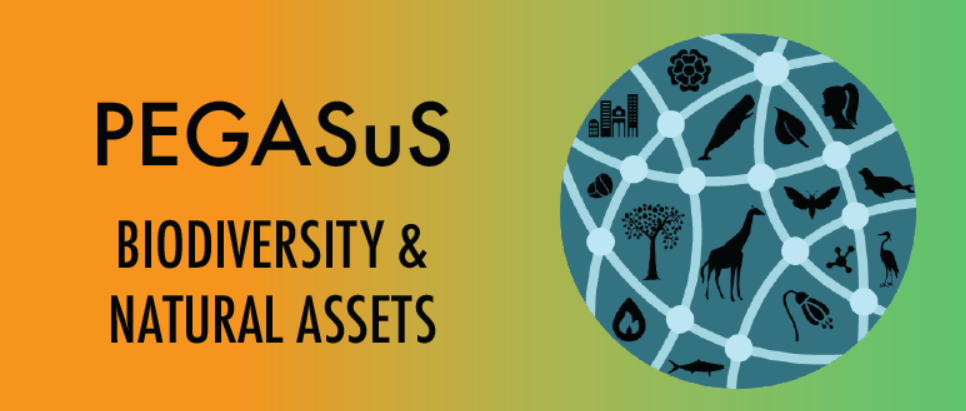BC3´s research project, EQUIVAL, one of the 5 winner of PEGASuS ( Biodiversity & Natural Assets) grant programme


BC3´s research project “Nurturing a Shift towards Equitable Valuation of Nature in the Anthropocene (EQUIVAL), one of the 5 winner of PEGASuS, Biodiversity & Natural Assets grant programme“
We are thrilled to announce these winning projects. They each take creative and wide-ranging approaches to understanding issues that matter for humans – from the loss of biodiversity on the world’s mountains to the disappearance of native bees in Bolivia. This is research that will have real impacts on the lives of people everywhere
The five projects awarded funding in the first round of the Program for Early-stage Grants Advancing Sustainability Science (PEGASuS) focus on questions critical to human wellbeing – from sustainable farming to the loss of mountain biodiversity.
This initiative is funded in part by the Gordon and Betty Moore Foundation’s Science Program and the NOMIS Foundation. PEGASuS is jointly administered by Future Earth and Colorado State University’s Global Biodiversity Center. It seeks to bring together researchers from different scientific disciplines to explore areas critical to the health of humans and the planet.

Principal Investigator of EQUIVAL Research Project, Prof. Unai Pascual (Ikerbasque Research Professor at BC3)
About the Project:
“Nurturing a Shift towards Equitable Valuation of Nature in the Anthropocene (EQUIVAL)”
In order to secure more ethical and more effective approaches for nature conservation, social equity needs to be integrated as a key aspect in environmental governance. This involves recognizing and creating transparent and participatory mechanisms that can explicitly include the voices of the diversity of stakes and worldviews about human-nature relations. This necessarily requires that valuation of biodiversity (a shorthand for nature or any biotic system as seen by modern science, or other knowledge systems) is also an equitable process. Equitable valuation requires: recognition of diversity of worldviews on human-nature relations, guaranteeing transparent participation of stakeholders, and being mindful of the distribution of benefits and burdens of valuation-based decisions.
EQUIVAL provides the seed for a transdisciplinary (integration of multiple disciplines together with involvement of stakeholders) vision of the role of equity in the valuation of nature. It seeks to identify and analyze on-the ground cases with varying degrees and understandings of equitable valuation-led decision-making processes. By so doing it aims to demonstrate the impacts of equitable valuation on nature conservation, as well as the opportunities and challenges that equitable valuation faces under varying social-ecological conditions. EQUIVAL will select and document about 30 case studies from the Global South and come up with a set of robust indicators that can connect equity in valuation and the level of conservation effectiveness. EQUIVAL will establish a network of scientists, and other stakeholders, such as NGOs, end-users, including indigenous peoples, policy makers focused on nature conservation-poverty reduction nexus, across administrative scales and intergovernmental science-policy organizations such as the Intergovernmental Platform of Nature and Ecosystem Services (IPBES).
Partners in EQUIVAL:
BC3 Basque Centre for Climate Change (BC3) – Coordinator
Universidad Autónoma de México (UNAM
Full information:EQUIVAL PROJECT

About Future Earth
Future Earth is a major international research platform providing the knowledge and support to accelerate transformations to a sustainable world. Launched in 2015, Future Earth is a 10-year initiative to advance Global Sustainability Science, build capacity in this rapidly expanding area of research and provide an international research agenda to guide natural and social scientists working around the world. But it is also a platform for international engagement to ensure that knowledge is generated in partnership with society and users of science. They are closely engaged in international processes such as the United Nations’ Sustainable Development Goals and climate and biodiversity agreements (United Nations Framework Convention on Climate Change and the Convention on Biological Diversity).
Future Earth is built on many decades of international research on global environmental change carried out by projects sponsored by DIVERSITAS, the International Geosphere-Biosphere Programme (IGBP) and the International Human Dimensions Programme (IHDP). Over 20 projects, ranging from the Global Carbon Project to the Earth System Governance project, have joined Future Earth. From this intellectual base Future Earth is launching Knowledge-Action Networks to catalyze new research and partnerships around eight key challenges to global sustainability.
Future Earth’s five Global Hubs are based in Colorado, Montreal, Paris, Stockholm and Tokyo and coordinate and catalyse new research for global sustainability. Regional Centres are operational in Asia, Europe, the Middle-East and North Africa and Latin America and the Caribbean, while Regional Offices are emerging in Africa and South Asia. National Structures are also forming in countries across the planet.
They are an open network for scientists of all disciplines, natural and social, as well as engineering, the humanities and law.
